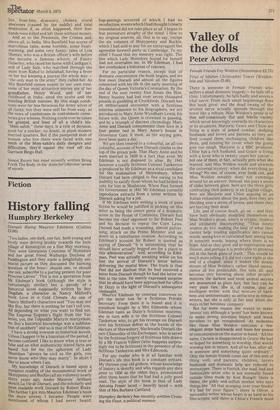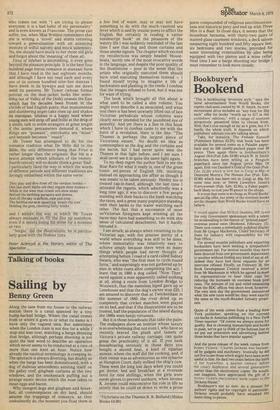Valley of the dolls
Peter Ackroyd
Female Friends Fay Weldon (Heinemann £2.75) Firuz of isfahan Christopher Tower (Weidenfeld and Nicolson £5.00)
There is someone in Female Friends who suffers a small domestic tragedy — he falls off a chair. Unfortunately, he falls badly and severs a N'ital nerve. From such small beginnings does this book grow, and the dead twang of the severed nerve actually spreads through the novel like a refrain. Miss Weldon's prose is of that self-consciously flat and febrile variety which never knowingly oversells its characters or its situations. Marjorie, Grace and Chloe are living in a state of armed combat, dodging husbands and lovers and parents as they are fired toward them, exchanging children like shots, and running for cover when the going gets too rough. Marjorie is a BBC producer, Chloe has a rich husband, and Grace is living with a lover who is twenty years her junior — not one Of them, in fact, actually gets what she wanted. And Miss Weldon winds and unwinds the universal mystery: when did everything go Wrong? No one, of course, ever finds out, and Miss Weldon sensibly does not rummage around for an answer. Instead, she puts a series of slides between glass: here are the three girls confronting their puberty in an English village, here are Marjorie and Chloe arguing in an Italian restaurant about the past, here they are bleeding over a series of lovers, and there they are burying their dead.
Life, and of course death, go on — and they have both obviously modelled themselves on Miss Weldon's prose, which is cryptic, ironical and ultimately disconcerting: "Thus lonely women do live, making the best of what they cannot help: reading significance into casual words: seeing love in calculated lust: seeing lust in innocent words; hoping where there is no hope. And so they grow old in expectation and illusion, and perhaps it is preferable to growing old in the harsh glare of truth." This would be much more telling if it did not come right at the end of a chapter, since it makes the steady stream of Miss Weldon's rather bland omniscience all too predictable. She tells all, and becomes very knowing about other people's motives: the darkest and most animal secrets are announced as plain fact, but fact can be very plain fare. She is, of course, also an intelligent writer, with that mixture of hardness and sentimentality so attractive in female writers, but she is only at her best when she stays in her heroines' company.
But for some reason she wants to make 'points' too, although a 'point' has been known to make strong novelists blanch and weak novelists to get remaindered. At moments like these Miss Weldon executes a few elegant steps backwards and loses her power of concentration on the matter in hand: "All the same, Christie is disappointed in Grace. He had so hoped for something to worship, that would worship him in return. And all he has, after all, is someone and something quite ordinary'." Only the female friends come out of this sort of thing well, and parents, children, lovers husbands and domestic help are reduced to stereotypes. There is Patrick, the mad, bad and fashionable artist who is not normally found outside films made by Ken Russ,e11; there is Helen, the giddy and selfish mother who says things like "All that stooping over your books! It's bad for your figure."; there is Oliver, a successful writer whose heart is as hard as his film-scripts; and there is Chloe's French maid who comes out with "I am trying to please everyone; it is a bad habit of my personality" and is even known as Francoise. The prose can suffer, too, when Miss Weldon remembers that she is writing a 'novel' and starts tottering toward a generalisation with an annoying mixture of wilful naivety and mock solemnity. No, she should have stuck to her three old girls and forgot about the 'meaning' of them all.
Firuz of Isfahan is astonishing, it even goes beyond the pleasure principle. It is the best four hundred page heroic romance in stanzaic form that I have read in the last eighteen months, and although I have not read each and every one of its sixteen hundred nine-line stanzas I have dwelt in its byways and lain me down amid its pastures. Mr Tower (whose formal portrait on the dust-jacket looks like something out of Valley of the Dolls) unseals the East which has for decades been frozen in the clichés of bad English poets; that monumental and slumbering angel-cake rises up and shakes its marzipan. Isfahan is a happy land where young men will strip off and frolic at the drop of a simile, talk to noble strangers at great length if the iambic pentameters demand it, where Kings are "puissant", merchants are "stout" and beneath becomes" 'neath".
Mr Tower has attempted to do for the romance tradition what De Mille did to the Bible, the only difference being that Firuz is rather longer than the originals. But his is a brave attempt which scholars of the twentyfourth century will no doubt think a great 'find'. I particularly liked the way in which the words of different periods and different traditions are lovingly embalmed within the same verse:
They play and dive from off the verdant brinks — One last short bathe ere they regain their homes — While in the west that crison orb slow sinks Behind the darkling parapets and domes And all the sky isitaffron, pale and rose The faithfql.nurse is squatting 'neath the tree' Holding the gem, resisting forty winks
and I admire the way in which Mr Tower always manages to fill the line up somehow, even if it means losing his sense for a moment
or two. , "Sergio" did the illustrations; he is particularly good with the fleshier tints.
Peter Ackroycl is the literary editor of The Spectator











































 Previous page
Previous page